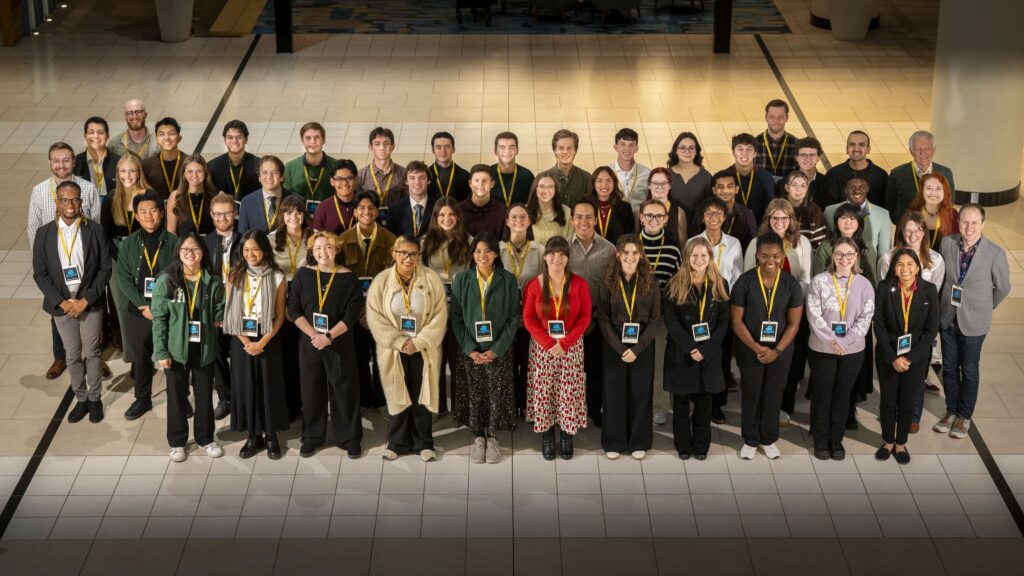Because members see so little of what goes on behind the scenes of a drum corps, when ageouts step into the role of administrator — such as when I took the job of assistant tour manager for the Glassmen as an ageout in 2004 — the adjustment can be quite a shock.
I spent a lot of time right before tour and during my first few weeks on the job trying to figure things out, and a lot of people gave me advice and support during that difficult time.
So while I think you can’t truly understand until you’ve done it, I want to pass the favor along. I hope some of the advice below will help reassure current and future young administrators.

When Brian Hickman hired me, he said, “The biggest thing you’ll learn is how much you don’t know.” And that is absolutely true. You’ll get quite an orientation to the inner workings of a corps! Money, food, volunteers, etc.: Know now that very, very little of what you saw as a member has much to do with the logistical processes of surviving day to day.
That’s a good thing, and you need to remember that the other members — many of whom you probably know or may have marched with — need to be kept in the dark.
Members aren’t supposed to know when gas stops are costing more than $1,000 a day, and the corps is short on petty cash. They should be reminded to appreciate the volunteers and staff (especially volunteers). Which leads to probably the most important thing to remember: Your volunteers are your lifeblood.
Do not, I repeat, do not upset them. Instructional staff are a dime a dozen; there are probably 20 people perfectly willing, and at least moderately capable, of being visual caption heads, but it’s darn hard to find people willing to use their vacation to spend 18 hours a day in a sweltering cook truck or to drive all night long.
There will be volunteers who will test you: your patience, your knowledge, your patience, your communication skills — did I mention your patience? You’ll get someone who forgets they’re not here on vacation, that you do actually need them to fill a vital role. You’ll get a few that want to parent their children nonstop, which is just as detrimental to the member as it is to the whatever volunteer role they’re fulfilling.
You’ll get some that are just plain old crazy or out to lunch! Laugh about it, and remember that it takes all types. You’ll also get at least a couple first-time volunteers who think they know everything and can run the corps better than you, or want to deviate significantly from the corps’ routine.
Be polite, smile, and pass the big problems along to the tour director — s/he has enough age, experience and therefore authority to keep people in their place (you don’t, so don’t try). There will be some folks who disrespect what you say because you are young and new to your job.
Don’t take it personally; just smile and nod, and remind yourself that all those folks thinking they know better would not last one week in your job. Be prepared for the fact you will work your hind end off, and at the end of the day you’ll still be getting told what you did wrong. It’s a rough job.
Someone always wants something from you, and that gets tiring. You won’t sleep much and there may be days you don’t get to shower and you’re bolting food down while driving to the hospital. It just takes patience and practice to get it right.
Remind yourself all the time that while you have been asked the same question all day long, this is the first time this person has asked it of you. It’s your responsibility to be pleasant and helpful at all times, no matter how long a day or how little sleep you’ve had.
For me, this was the hardest thing — I do not suffer fools gladly and I’m not a very patient person. However, I also viewed my role as sort of an interceptor — I tried as much as possible to take care of the smaller problems and questions to free Brian and Rod up for the big problems. Therefore, if you do your job right, you are going to end up answering the same questions 50 times a day.
At the same time, you also got to help out 50 people today. A positive attitude and a silver-lining outlook will help you keep your sanity. Be aware of your mistakes and try to fix them, but don’t beat yourself up too much. The best piece of advice Rod Owens, the tour director at the Glassmen, ever gave me was that the more things you do, the more mistakes you’ll make.
If you only do one thing a day, it’s really easy to do that one thing well, right? But if you’re doing 20 things in a day, you’re bound to slip up here or there. It’s OK.
Fix it as best you can, try not to do it again, and move on. Be mindful that to a community, especially your housing contacts, you represent the corps. I still wince when I remember how badly I reacted to, for example, clerks in grocery stores who couldn’t or wouldn’t help me during my first few weeks on the job.
Meanwhile I’m wearing my corps jacket! I made the whole corps look bad. I’ve heard horror stories from band directors of how some young first-year administrator treated him or her like dirt, and now that corps is not welcome at that housing site any more. Be polite to everyone.
You may be the only person related to drum corps that some of these folks ever meet. Yes, you will hear jokes about how much you must like bread and/or milk every single day, all summer long. You don’t have to laugh, but smile anyway, and take the chance to educate people on the good work we do.
Look at it as an opportunity rather than a burden. Have patience with young members. If you marched, remember that you were once them, and be patient without being coddling. Some of them will need extra discipline, counseling, direction, etc. — I tried to relate to the members as sort of a big sister, and it worked for me. If you marched, the members you used to share the bus with may try to mine you for information; don’t get sucked into it.
You’ll want to vent — but they really don’t need to know. Maintain professional distance while still being friendly and approachable. One last word — you are not instructional staff. They have an entirely different focus and an entirely different experience every day.
You are on duty literally 24/7; you can’t go down to the McDonald’s with them, or play poker on the bus at night, or do anything that would deflect your attention from dealing with the volunteers and the members.
A lot of young administrators get into the job thinking they can finally be buddy-buddy with the staff they’ve admired for the last couple years, but in reality it will do you more harm than good. They cannot relate really at all to what you do all day every day; they’ll start complaining about the food, or the sleeping schedule, and you’ll end up getting quietly angry because they really do not get it.
It will also distract you from your real focus of taking care of the corps. So just don’t even have that expectation going into it. You will eventually find a balance of being on par with them rank-wise, being able to converse on a level, and having to maintain some distance.
The flip side of that is that you get to get close to the administrative staff, who have their own special set of good times and rituals (mostly, in my case, revolving around diet soda and black coffee!). I hope I haven’t scared you off too much. It was quite a rewarding experience for me, and I learned a great deal. I also worked my butt off! But I got to go to many interesting places and meet so many wonderful people, some of whom I’m still very close to.
So go into it with a spirit of adventure and hard work, keep a positive attitude, and you’ll do fine! Emily Tannert is a sophomore music education/percussion performance major at Louisiana State University in Baton Rouge, La., and holds a journalism degree from Northwestern University.
Emily aged out of the Glassmen in 2003 and was assistant tour manager for the corps in 2004 and 2005.
You can contact Emily at [email protected].





